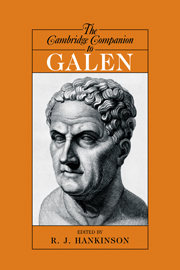Book contents
- Frontmatter
- 1 The man and his work
- 2 Galen and his contemporaries
- 3 Methodology
- 4 Logic
- 5 Language
- 6 Epistemology
- 7 Psychology
- 8 Philosophy of nature
- 9 Anatomy
- 10 Physiology
- 11 Therapeutics
- 12 Drugs and pharmacology
- 13 Commentary
- 14 The fortunes of Galen
- Appendix 1: A guide to the editions and abbreviations of the Galenic corpus
- Appendix 2: English titles and modern translations
- Bibliography
- Index
12 - Drugs and pharmacology
Published online by Cambridge University Press: 28 September 2008
- Frontmatter
- 1 The man and his work
- 2 Galen and his contemporaries
- 3 Methodology
- 4 Logic
- 5 Language
- 6 Epistemology
- 7 Psychology
- 8 Philosophy of nature
- 9 Anatomy
- 10 Physiology
- 11 Therapeutics
- 12 Drugs and pharmacology
- 13 Commentary
- 14 The fortunes of Galen
- Appendix 1: A guide to the editions and abbreviations of the Galenic corpus
- Appendix 2: English titles and modern translations
- Bibliography
- Index
Summary
PHARMACOLOGY, PHARMACY AND DRUG-LORE
'What drugs will not cure, the knife will; what the knife will not cure, the cautery will; what the cautery will not cure, must be considered incurable.' This final maxim of the Hippocratic Aphorisms gives a good impression of the general attitude towards drugs in ancient medicine. Drug lore holds a middle position within the tripartite system of ancient therapeutics: dietetics, pharmacology and surgery (including cautery). Dietetics is not mentioned in the aphorism, because it is regarded as a non-invasive method of preserving health rather than of curing disease, and is thus applied prophylactically, or only in mild cases of disease, while pharmacology and, especially, surgery are regarded as rather drastic 'intrusions' into the patient's organism – chosen in order to counteract the noxious impact of an illness or wound. Between the two of them, pharmacology has two advantages: it does not imply the additional risks of surgery, i.e. the possible complications by bleeding or infection of the surgical wound (a very real danger in times without asepsis and antisepsis!); and it is more apt to stimulate the body's self-healing processes to restore its original balance – a holistic view of the human organism to which Galen was especially disposed. Therefore, in Galen's view 'the best physician was the one most capable of treating surgical conditions by means other than the knife, and particularly by diet and drugs'.
- Type
- Chapter
- Information
- The Cambridge Companion to Galen , pp. 304 - 322Publisher: Cambridge University PressPrint publication year: 2008
- 36
- Cited by

